Q&A With Brian Ivie
"My hope is that many people hear the gospel and come to know the God that I know. That's really the greatest result possible with any film I make."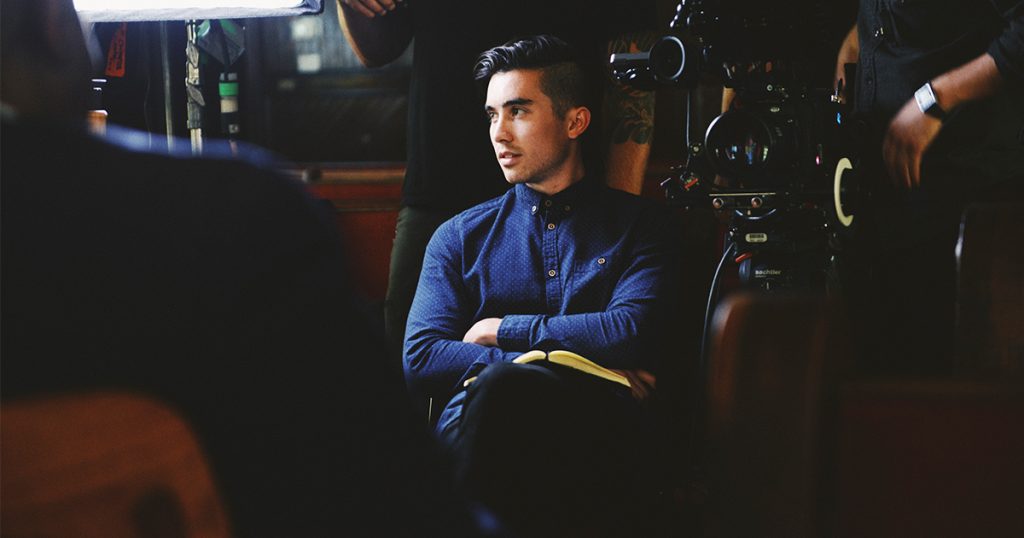
Brian Ivie was on his honeymoon when he heard the news that Dylann Roof had shot and killed nine members of Emanuel AME Church in Charleston, SC.
Brian spoke to the “War Cry” about his journey to Christ and his film, “Emanuel.”
WC: What is your faith background?
Brian Ivie: I came up in Southern California and was very much a cultural Catholic. I clocked in and out of
WC: He brought you to Christ?
Brian Ivie: In a way. It was a team effort to bring me to Christ, but it started with him. There was something about his Christianity that was so jarring because what I was familiar with was the cultural Christianity–that kind of dead religious ritualism that you oftentimes see in the American church– a lot of wealthy people who aren’t very generous. They say they believe in this God, but I couldn’t reconcile the lack of action with the faith they were preaching. With this man, you had somebody who adopted twenty kids with severe disabilities. That felt like Jesus to me. I needed to see that to break down my barriers. I ultimately received a gospel presentation, a very simple one on my computer that was about Jesus from the cross. That’s changed my life.
WC: That’s wonderful. What led you to form Arbella Studios?
Brian Ivie: It was a bad experience, really, in Korea. I felt like I needed to. After I became a Christian, I asked myself “What do I do from here?” I make movies. That seems like a frivolous pursuit if you’re going to live for God and try to help and serve people as you do in The Salvation Army. But God continued to call me back to this mission. The difference was what I was making. I was creating art for him and his glory, trying to introduce people to who God is.I met overseas and started Arbella as an attempt to formalize that truth and calling. Arbella is two core tenants of faith and social justice because I want everything we do to have an impact on the world. For “The Drop Box”,we built a maternity shelter in Korea, serve many orphans, and try to get children adopted domestically. I still get stories in my inbox from families who said they adopted a child because of “The Drop Box”movie. Beyond that fact, we’re giving any producer profits, meaning anything I make or my producing partners make, to families. We hope that this will lead to real change and justice with an interest of our country.
WC: Oh, I see. That’s the outcome. My editor-in-chief’s wife is a friend of Steph Curry’s. How did he get involved?
Brian Ivie: It doesn’t make sense on paper, only because nobody knew Steph Curry was starting a film production company. He’s actually a member or an executive at Sony Pictures has come to one of our pre-screens for “Emanuel” saw the film had a background in church immediately ran up to me after and said, “I have to show this to Steph Curry.” I said, “Steph Curry is a basketball player. Why would you do that?” He said, “He’s starting a company in Hollywood and they’re going to be about face and film.” I said, “Let’s do it.” Steph watched the movie, and I think for him, it was a perfect representation of his heart for people. It was a representation of his own Christian faith.
It was an opportunity for him to lift up a small movie and say, “I’m not going to be about profit. I’m going to be about purpose.” That’s really the heart of their company, and he’s living that out with a lot of integrity.
WC: So he got in touch with you and became a supporter.
Brian Ivie: Yeah, and he felt like, “What can I do?” He’s really promoting the film and has been a great voice for us.
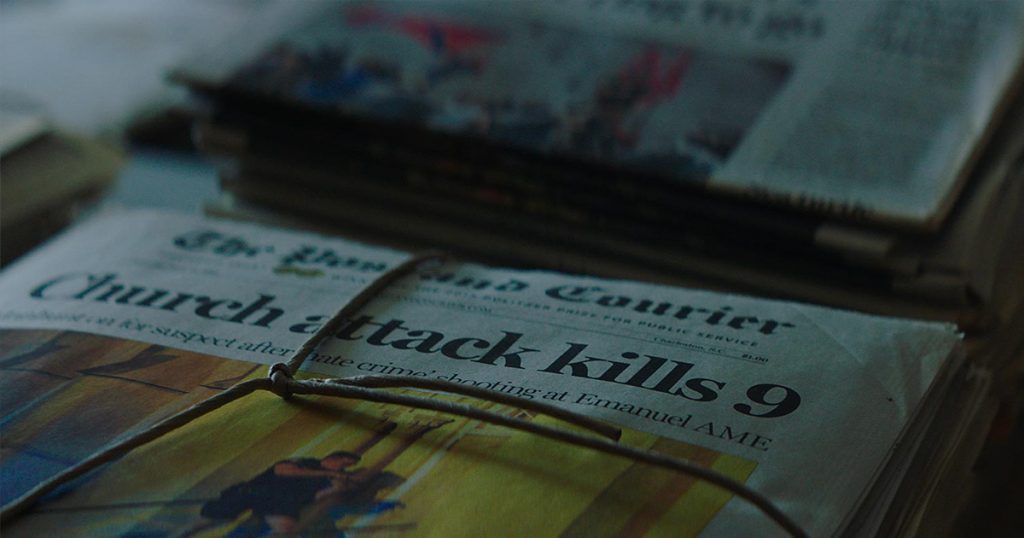
WC: What brought you to the story originally?
Brian Ivie: Good question. I got married in June 2016 and I was actually on my honeymoon. I was standing on the balcony with my Bible, and I walked into the room. I saw my wife crying over her computer. I didn’t know what was going on. I was concerned that something had happened to her or to somebody in our family. She looked at me and said, “Nine people just got shot in a Bible study.” That was a surreal moment only because it was the worst possible thing invaded the best possible thing. It was like my greatest moments had just collided with one of the worst moments possible. I think that was something that I needed. I needed to see the story in that context because it was a perfect representation of the way my life was, for the most part, versus the way other people have to endure life.
In that moment, I remember looking at my wife and saying, “How does this happen? What are you talking about?” She explained the whole story. This white supremacist walked into a black church and shot nine people. Then she told me the family members were forgiving him in court. I turned the computer around and watched the video, which is in the film. It was the hearing where one by one the family stood and forgave the murderer in court. I knew God had done something that maybe a lot of people didn’t understand. It wasn’t even that they said they forgave him that moved me. It was that they said they enjoyed and welcomed him into their Bible study with open arms. That was the kind of love I hadn’t seen since I was in the Korean orphanage. And I wanted the world to know about it.
The problem was I didn’t feel it was my story to tell.I told my wife, “Whoever tells that story, I hope they don’t skip that part.” One year later, after really trying to avoid the story and doing a total Jonah, I refused to go to Nineveh. I trult believed that this wasn’t my story. I don’t know why you would want me to tell this. This is inappropriate. I’m a white American. This doesn’t make sense. But God wouldn’t let it go. I finally jumped on a plane and started meeting with the families. The rest is history.
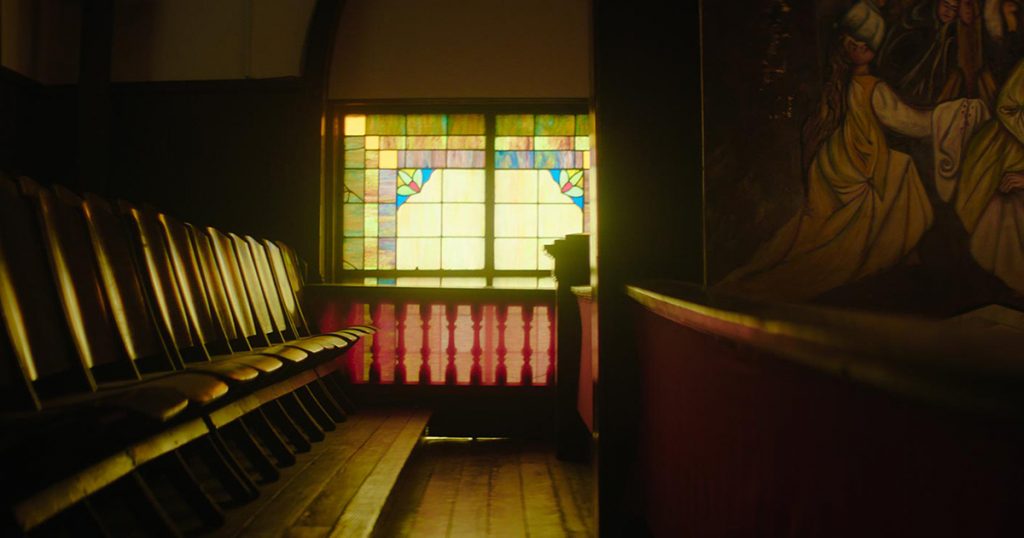
WC: You definitely have a sense of God leading you as you go.
Brian Ivie: Absolutely. Dragging me perhaps to become better at times.
WC: Most people wouldn’t consider offering that kind of forgiveness and love. It leads me to think that the idea that Christ is the answer has become a cliché. Some would say it’s naive or superficial, or even judgmental to say that. You use that as kind of a bludgeoned to hit people with.
At the same time, do the testimonies of those in the documentary implore us to consider the new birth offered by belief in Jesus as crucial to building a more compassionate world? I think of Paul’s word. Paul, talking about our two natures, or sin nature and our spiritual nature and how there were within us. Do you resonate with that?
Brian Ivie: Absolutely. The thing we don’t want to say is that our world today is based entirely on self. We sit on the throne of our own lives. It’s about self-expression, self-loveand then somebody does something to you.That’s why this film has been controversial in a funny and unexpected way. What has been controversial, of course, is families loving their enemy. But when you understand Christ and understand that he paid an unpayable debt for you, and that before God, we all need forgiveness in a way that is just as severe as even a murderer. It gives you the resources to humble yourself before even your enemies and extend the same mercy that you’ve experienced in your own life. That’s something Christianity has done from the beginning in every justice initiative that has put us all on the same level. We can love anybody no matter what they’ve done, where they’ve from, what they look like, and the ground for the cross is flat. There’s this false idea that one day, we’re going to just all get along just because there’s some human ideal that we have.
But we all know that, at least within the Christian context and the Judeo Christian belief, is that impossible, apart from redemption. It changed human heart not just, they say, politics turns the bush, but the gospel cuts the root. With these families, you see people who have been changed and forgiven. Therefore, they have the ability to extend that. It was something that led me through the whole process. I feel like I made the whole movie from the place of no one, and I stand the need of that same mercy and grace. That’s also why the families trusted me and why they agreed to do it.
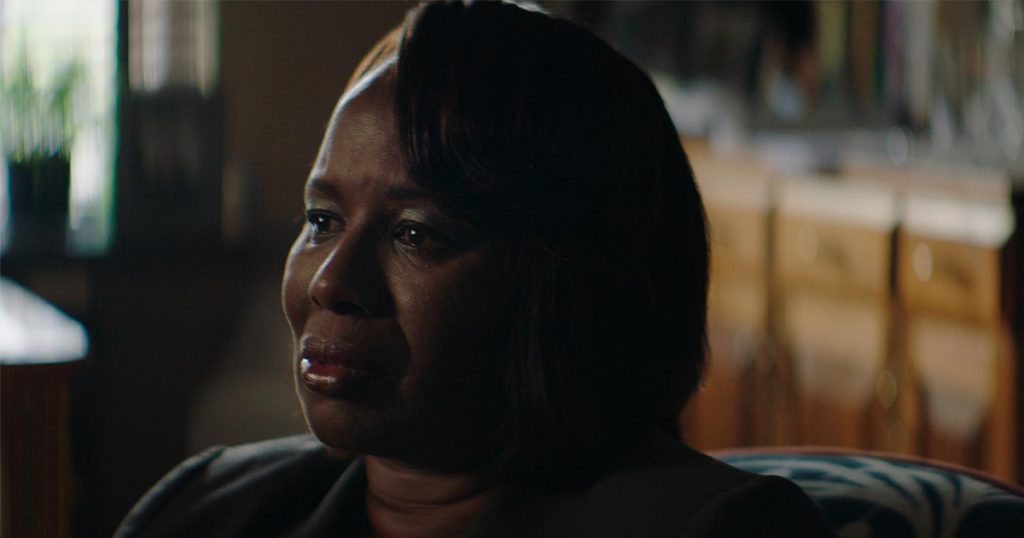
WC: Which of the survivors’ testimonies made the biggest impression on you?
Brian Ivie: It was always Felicia Sanders. Felicia was the one who said that we welcomed you to our Bible study with open arms. It wasn’t just that though. When she finally faced Dylann Roof, she said that although the blood on her Bible is her son’s blood, she still reads the same Bible. The pages are now pink. She talks about how it reminds her how the blood of Jesus was shed for her and for the murderer, too. And to me, in the world we live in today, to hear that kind of expression of love, faith, and understanding of the gospel is so rare, so beautiful and so needed.
I think for her, given what she went through watching her son be shot before her, she’s able to say that that the blood of Jesus was shed for you and for me. That was everything. That’s why I made the film.
WC: What do you see as solutions to our racial, cultural, political and economic divides that are such polarizing forces in our country today?
Brian Ivie: I’m a filmmaker. So, I wouldn’t say I have all the answers. What I do for a living is try to find people that do. Something I’ve learned through this process and about reparations, equity and healing is that a lot of the white community in particular talks about racial reconciliation. But the black community doesn’t talk about it that way at all. Because that term itself implies that we were once one, and we’re once together in some beautiful harmonious romantic way.
But of course, even a cursory glance at our history would say that was never the case. People were kidnapped and forced here by the millions. And slavery is one of the greatest economic determinants that could be placed upon to people. So, you still have consequences in our society today.
One way we can start a healthier conversation is to recognize that we need racial healing and transformation rather than reconciliation. There are so many individuals like Dylann Roof that exist. There are fewer, but there’s a sense of systemic injustice that still exists in our country. Addressing that, especially with the criminal justice system, and trying to understand how we bring that sense of dignity and essential humanity into the system, is going to require us to work hard, hire differently, and not just give lip service to the issues to ensure black businesses are lifted up. We treat these things at that level and try to change things in those ways so that the systems themselves are working in certain people.
I grew up white and privileged, and so doors were open to me that weren’t open to other people. Having those hard conversations and then doing the hard work is really what’s going to be the solution.It’s going to take time and the African-American community has been very patient with us.
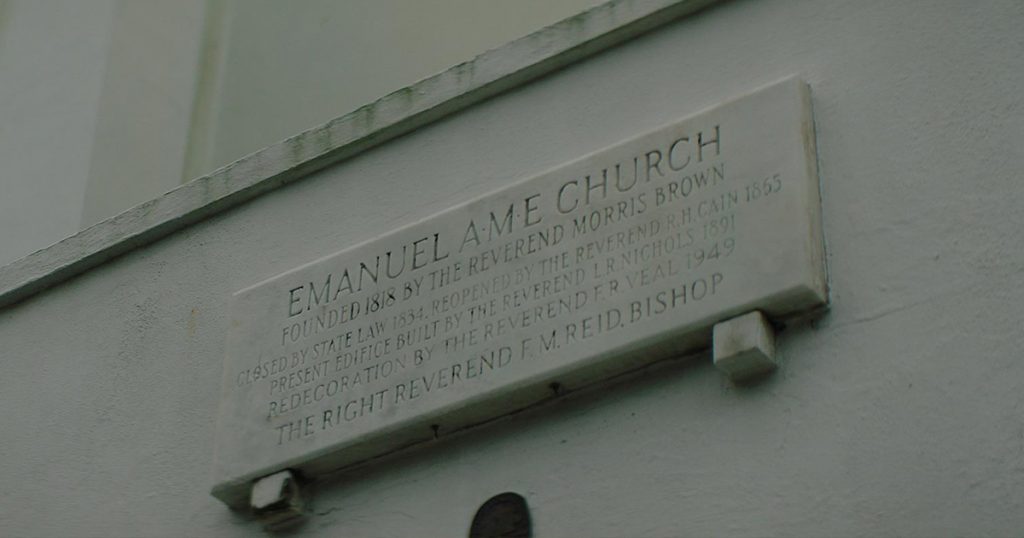
WC: When I first saw their reaction, I thought maybe they reacted so graciously because of the suffering that their people have endured for centuries. I don’t know where else it would come from.
Brian Ivie: That’s the thing. It’s the culture of forgiveness because there’s this survival mentality. I also say this situation was different. There was something greater going on. A lot of African-American pastors have told me they would have been surprised if they didn’t forgive because that’s what they’ve been about from the beginning. That’s a pretty sobering idea.
WC: It is. Even to forgive the death of the guy who first formed the church, that history portion that you included was really helpful in the film.
Brian Ivie: For sure. Thank you. I’m glad.
WC: It’s been a couple of years since you finished production. What do you see as the outcome for this movie? What are you moving into now as a result?
Brian Ivie: It took a long time to get distribution and find a home for the movie for all the reasons we discussed. It’s too conservative for the liberals and too liberal for the conservatives. It’s very much like Jesus, if I’m allowed to say that. It’s a film that doesn’t give you any easy answers and presents the truth, which is uncomfortable at times. And so, it was hard. It wasn’t a feel-good movie, but it also wasn’t just about social justice and politics. It was a film about the blood of Christ. We were finally able to create the film through Fathom Events, which is the company I’m so thankful for. They take in films that deserve to be seen but maybe don’t have the same outlet or audience, and they take risks on faith films. Thousands of theaters released the movie on June 17, the day of the shooting, which was an important thing for our team. We wanted the world to get together and experience it the way the family did in some way. It also showed again on June 19.
In the long term, the film will be online so that people can share it with friends, family and people that need this message.
WC: Do you know where it’ll be available yet after the theater release?
Brian Ivie: Yes. It will be released to the public for rent and buy for
WC: What do you hope the film will accomplish?
Brian Ivie: There are a couple of things. On a purely horizontal person-to-person level, my hope is that it causes the church, in particular, to take the issue of race and racial healing more seriously because it’s not important to you. And I’m speaking to the reader. It’s very important
More than anything, my hope for the film is that people come to see that God is real, and that he participates in our suffering. My hope is that many people hear the gospel and come to know the God that I know. That’s really the greatest result possible with any film I make.
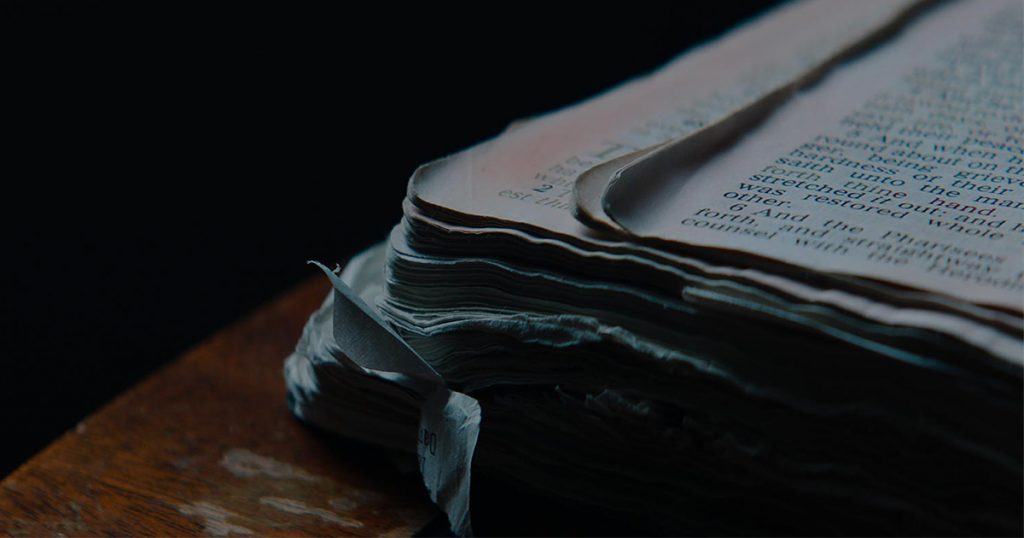
WC: On a practical level, how was this funded?
Brian Ivie: We actually raised the money through a group of investors in the Northeast. A group of Christians who had a heart for this issue and share the heart of God with the world. We shared the film with them and I did my typical vision, which is to say that the houses of worship of our culture are Netflix, Amazon, Hulu and YouTube. And that’s where we need to be with films and with content that shares Christ.
We raised the money that weekend. Which is very rare thing to do. We are extremely grateful to have investors who understand there’s a double bottom line. It’s not just about making their investment back, which hope to do. But we also know that there’s another line, which is the impact on hearts and the transformation we’re going to see. That’s already happening.
WC: What’s happening?
Brian Ivie: Just seeing the impact on people’s lives and people who need hope or healing or seeing testimony after testimony of people who have. People are learning and re-learning who God is, and they have found light in the dark places of their souls when they watch this film.We’ve often heard people say, “Well, if these people can live, I can still live.” And that is the great – that to me is worth every penny.
WC: Really? Can you give me an example? Do you have somebody in mind?
Brian Ivie: There was a woman who came to a screening about a year ago, and she was in a really dark place. I didn’t even know. Then a few weeks ago, she texted me, and said that she was in the darkest place she’d ever been. She was suicidal. But this movie is what saved her life. She felt excited. These people can go through this terror, and they can live, and I can live. She left that dark pit, I think, or grabbed the rescue, the rope that God was giving to her. To me, that’s really who we made the film for. I think that’s what the families are all about now because a lot of them travel with us and show the film. They could see this as their responsibility to share the things they’ve learned and share who Christ is with the world that’s hurting, confused and suffering.
WC: Wow. How do you cope with the evil as represented by the shooter?
Brian Ivie: There’s a couple of ways, which is actually a very good question I don’t get asked a lot. I have never been through anything as hard as that in my own life. It’s much easier to go through when you’re separated by a camera. It’s not somebody that was close to you that died, but I think for the families and how they cope and how they deal with this, there’s this theological truth. Then there’s like the real lifethings, the practical things. Practically, a lot of them have gone through counseling. They’ve had to. They’ve had to step into that space of vulnerability and say, “Hey, I need help. I need people who help me, talk me through this, and walk me through this.” They’ve opened themselves up to that process. They’ve had to really grieve and mourn. And I think that’s actually been really healthy. So, we don’t have to go to other churches to try to just be in a different kind of environment. That’s how they’ve been coping.
But I think you also cope through the message of the Bible and in the truth that even though they forgave, God is just, and that in due time, he says, don’t revenge yourself, but leave it to the wrath of God. We know that God will make up the difference, and He will not be mocked. People will reap what they sow, including Dylann Roof if he does not repent. So, they can rest in the fact that God will make it all right in the end. And also, restore all things that were lost right at the shooting. I think they have that eternal hope as well as the present help of their community.
WC: What are your plans now for moving ahead with other projects? Or what do you think God is calling you to?
Brian Ivie: It’s funny. Much of what I’m doing now is trying to steward the film, the activism around the film, figuring out how we can use the film to educate and to help other organizations. I have a lot of stewardship there. I’m also working on a film about Kirk Franklin, the gospel singer, which is another story of redemption. Someone who was abandoned as a kid, and he lived for God. There’s a lot that I relate to in that story. I’m just praying about what I can do next that’s going to make a real impact







